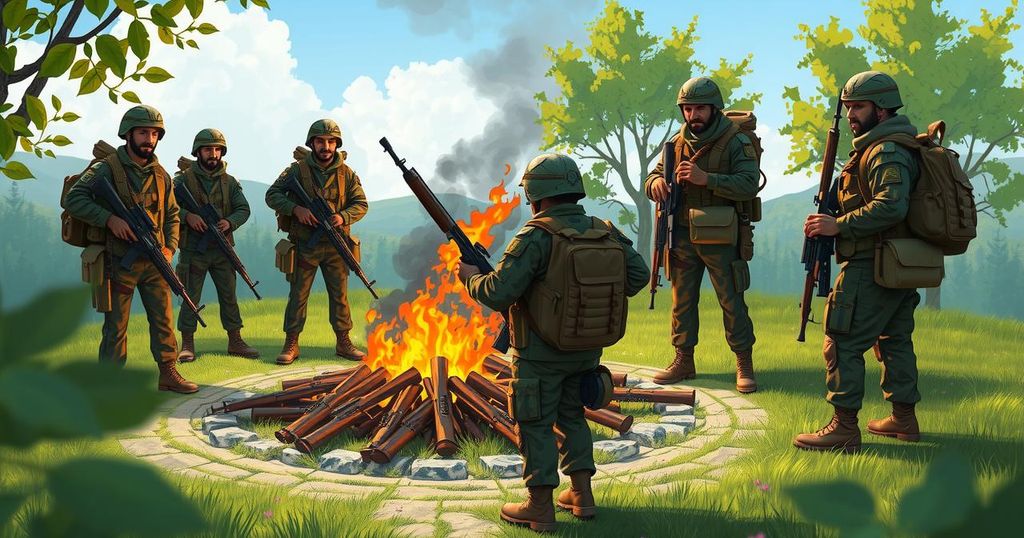- Kurdish fighters burned weapons in symbolic disarmament
- Ocalan’s call for disarmament adds momentum to peace talks
- Bahceli’s support marks a shift in Turkish politics
- Concerns grow over potential splinter groups emerging from PKK
- Previous peace efforts have ended in failure, raising doubts about success.
30 PKK Members Symbolically Lay Down Their Arms in Iraq
Turning a new chapter in the Kurdish conflict, around 30 members of the Kurdistan Workers’ Party (PKK) performed a poignant ceremony in northern Iraq on Friday. Clad in camouflage, they gathered to burn their weapons in a symbolic act signaling a potential pivotal moment, perhaps the first real concrete move towards resolving a 40-year-old conflict. This ceremony follows a call to disarm from Abdullah Ocalan, the PKK’s jailed leader, who emphasized the need to lay down arms for a fresh peace initiative with Turkey in a video message this very week. This sort of display of unity is something that has been long anticipated in a region wracked by violence and upheaval.
Devlet Bahceli’s Role in Initiating the Peace Effort
Turkey’s initiative was set into motion a while back, specifically in October, led by Devlet Bahceli, a prominent ultranationalist who traditionally has been against any leniency toward Kurdish rights or identity. The Turkish government has since welcomed this initial step towards the PKK’s disarmament, but many still have their doubts, particularly regarding the future of Kurdish combatants in Syria. Ocalan’s past threats from prison—despite his imprisonment—remain influential, especially as he holds significant sway over the Kurdish movement across regional borders, not just within Turkey itself but extending into Iraq and Syria.
PKK’s Evolution from An Insurgent Group to Political Movement
Going back to the deep roots of this conflict, the PKK has been involved in an armed struggle against Turkey since 1984. The initial aim—a Kurdish state—has morphed over the decades into demands for autonomy and rights. Abdullah Ocalan, the group’s founder, has been incarcerated since 1999, serving as both a figurehead and a symbol for Kurdish rights. This new trajectory for peace marks a major pivot for Bahceli, who once staunchly supported state actions against the PKK. Ocalan urged the PKK in February to either disarm or face the consequences, leading to an announced ceasefire in March and finally the decision to disarm shortly thereafter.
Uncertainties and Threats of Splinter Factions
Still, many uncertainties loom large. While PKK officials hope to integrate former fighters into Turkey’s political fabric, there are persistent fears of splinter factions sprouting from within their ranks, which could continue engagements in violence. The potential for divisions remains poignant, particularly marked by recent attacks—one on Turkey’s aerospace industry—following Bahceli’s initial announcement. The government has a long history of failed peace talks, with the last serious attempt crumbling in 2015 after a series of violent incidents. As Turkey grapples with its pro-Kurdish political climate, with thousands imprisoned for alleged PKK links, the stakes have never been higher.
Geopolitical Context and Regional Shifts
The ongoing talks come during a crucial phase amid geopolitical shifts across the Middle East. The backdrop of a changing landscape—fueled by the continuing Israeli-Palestinian conflicts, and Turkey’s dealings with various regional powers—culminates in a call for better security. Notably, Turkey has recently favored an arrangement between the Syrian regime and Kurdish forces, supporting the merger of Kurdish-led factions into a new national army in Syria. Such moves could alter the dynamics radically but might not sit well with every faction involved. The ramifications of these discussions are enormous for all those involved,
Dual Aspects of the Peace Negotiations
Insider analysts, like Hamish Kinnear, highlight how Ocalan’s recent shift from armed conflict plays into the PKK’s current weakened condition. After military setbacks and loss of influence, this could be interpreted as a strategic retreat more than anything else. However, some critics speculate that the government’s entreaties for peace are more about ensuring Kurdish backing for future political frameworks than genuine reconciliation. With an eye toward upcoming constitutional debates and Erdogan’s plans post-2028, the motives for these negotiations can be multi-faceted and deeply political.
The Road Ahead in Turkey’s Kurdish Conflict
In summary, Turkey’s quest to dissolve the PKK’s insurgency appears to be entering a new phase, albeit with various uncertainties ahead. The symbolic laying down of arms by PKK fighters does signal hope, but the route to tangible peace and integration remains fraught with challenges. As key players like Bahceli and Erdogan push for political support from Kurdish factions, one can only speculate whether the primary aim is to ensure political longevity or to truly enhance Kurdish rights and autonomy in Turkey.
The effort to resolve Turkey’s long-standing Kurdish conflict is seeing new momentum with recent gestures like the disarmament of PKK fighters. Although this is a step forward, uncertainties abound about the future of Kurdish groups and their political rights. The motivations behind such peace talks and the interplay between power dynamics in the region will require close scrutiny as they unfold.






